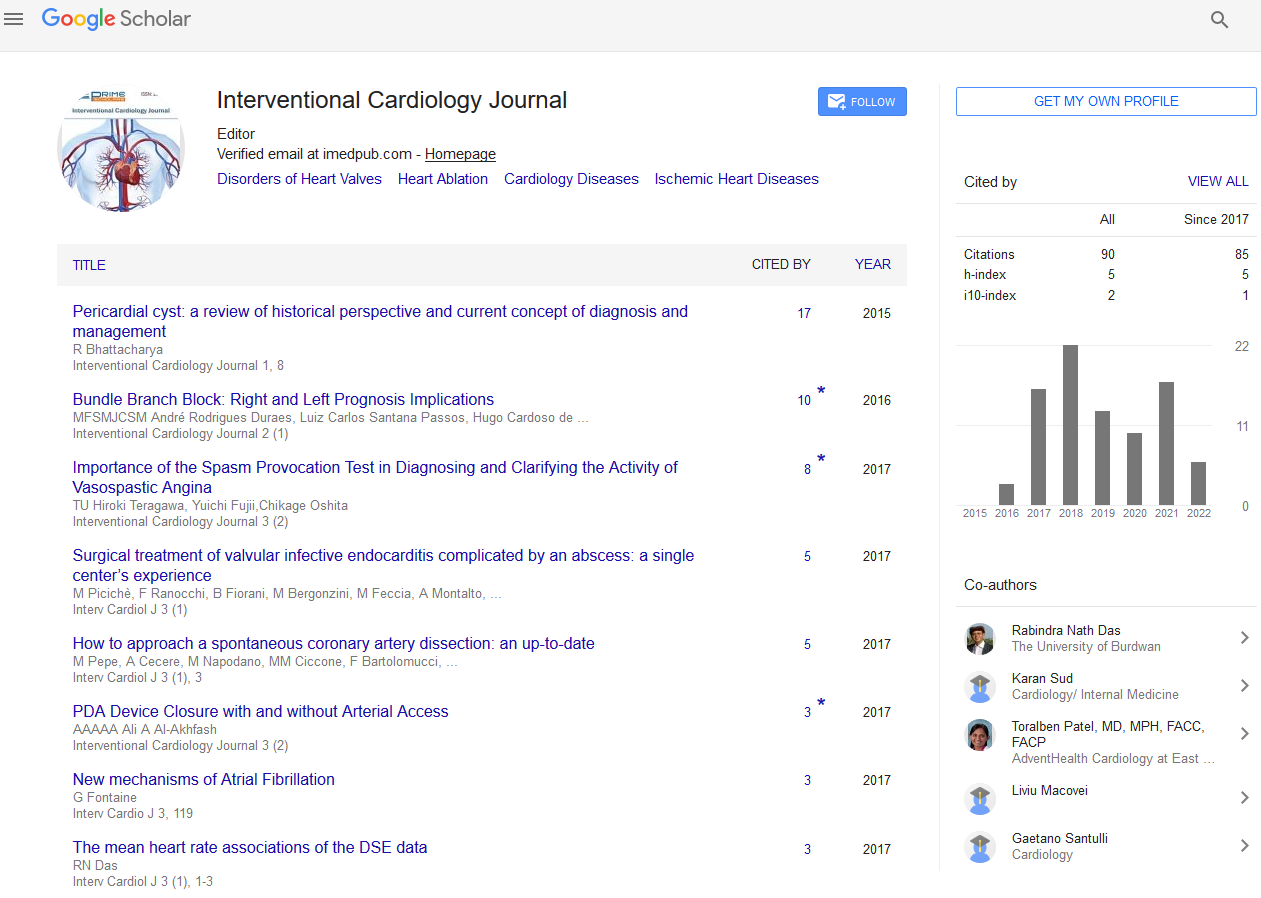Opinion - (2023) Volume 9, Issue 12
How Artificial Intelligence is Revolutionizing Interventional Cardiology: A Game-Changer in Cardiovascular Health
Lara Jean*
Department of Medicine, New York Medical College, Australia
*Correspondence:
Lara Jean,
Department of Medicine, New York Medical College,
Australia,
Email:
Received: 29-Nov-2023, Manuscript No. IPIC-23-18771;
Editor assigned: 01-Dec-2023, Pre QC No. IPIC-23-18771 (PQ);
Reviewed: 15-Dec-2023, QC No. IPIC-23-18771;
Revised: 20-Dec-2023, Manuscript No. IPIC-23-18771 (R);
Published:
27-Dec-2023, DOI: 10.21767/2471-8157.9.12.117
Introduction
Artificial Intelligence (AI) algorithms analyze extensive imaging
data obtained from angiograms, MRIs, CT scans, and echocardiograms,
aiding in precise lesion identification, quantification,
and characterization. AI-driven reconstruction techniques improve
the quality of images, enhancing visibility and aiding
in detailed assessments of arterial structures and lesions. AIbased
tools facilitate rapid and accurate diagnosis by identifying
subtle patterns and features, enabling risk stratification
for patients with Coronary Artery Disease (CAD) or other cardiovascular
conditions. AI algorithms assist in evaluating lesion
severity, optimizing treatment strategies, and recommending
suitable interventions based on individual patient characteristics.
Real-time AI assistance during interventions provides procedural
guidance, aiding in precise catheter navigation, stent
placement, and lesion modifications, thereby enhancing procedural
success rates. AI models predict procedural outcomes
and potential complications, enabling clinicians to make informed
decisions and tailor interventions for improved patient
outcomes. AI-driven risk prediction models identify high-risk
patients for adverse cardiovascular events, allowing for proactive
preventive measures and personalized interventions.
AI-powered remote monitoring systems facilitate post-procedure
patient care, enabling early detection of complications
and timely interventions, especially in remote or underserved
areas. AI algorithms analyze patient data, including genetic
profiles, lifestyle factors, and comorbidities, aiding in the development
of personalized treatment plans and optimizing
therapeutic outcomes.
Description
AI algorithms expedite drug discovery processes by analyzing
vast datasets, identifying potential therapeutic targets,
and predicting drug responses, fostering the development of
novel cardiovascular medications. AI tools integrate data from
multiple sources, including electronic health records, imaging,
and genetic information, providing comprehensive decision
support for clinicians and researchers. AI models continuously
learn and adapt from new data, refining their algorithms
and enhancing their accuracy and efficacy over time. Ensuring
high-quality and unbiased datasets is crucial for the reliability
and accuracy of AI algorithms. Addressing regulatory challenges,
maintaining patient privacy, and ensuring ethical use of AI in
healthcare are paramount. Overcoming barriers to implementation,
including infrastructure requirements, clinician training,
and acceptance, is essential for widespread AI adoption in clinical
practice. The future of AI in interventional cardiology holds
immense promise. Continued advancements in AI algorithms,
coupled with the integration of robotics, augmented reality,
and 5G connectivity, will further enhance the precision and capabilities
of cardiovascular interventions. In conclusion, AI's integration
into interventional cardiology marks a paradigm shift
in cardiovascular care. Its ability to augment decision-making,
personalize treatments, and improve patient outcomes underscores
its transformative potential.
Conclusion
Artificial Intelligence (AI) stands as an invaluable ally in interventional
cardiology, reshaping the landscape of cardiovascular
care. Its ability to process vast datasets expedites diagnosis,
prognostication, and treatment planning, enhancing precision
and efficiency. AI-powered algorithms aid in risk stratification,
predicting outcomes, and guiding therapeutic interventions,
fostering personalized patient care. Real-time analysis during
procedures ensures heightened accuracy, augmenting the expertise
of cardiologists. Moreover, AI-driven innovations facilitate
continuous monitoring and early detection of cardiac
anomalies, potentially averting critical events. Embracing AI in
interventional cardiology not only amplifies medical capabilities
but also holds promise in advancing preventive strategies,
ultimately elevating patient outcomes and shaping the future
of cardiac care.
Citation: Jean L (2023) How Artificial Intelligence is Revolutionizing Interventional Cardiology: A Game-changer in Cardiovascular Health. Interv Cardiol J. 9:117.
Copyright: © 2023 Jean L. This is an open-access article distributed under the terms of the Creative Commons Attribution License, which permits unrestricted use, distribution, and reproduction in any medium, provided the original author and source are credited.

